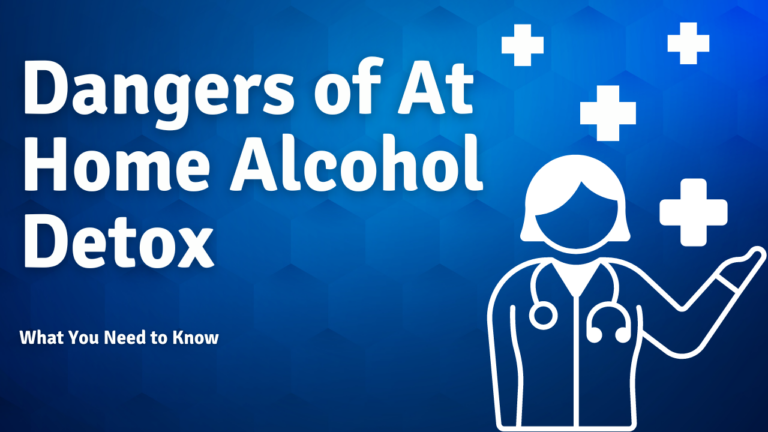
Dangers of At Home Alcohol Detox: What You Need to Know.
Alcohol detoxification, or detox for short, is the process of removing alcohol from the body. While detoxing from alcohol is a necessary step for individuals struggling with alcohol addiction, it can be a dangerous process if not done properly. Attempting to detox at home without medical supervision can lead to serious health risks and even death.
There are several reasons why at-home alcohol detox can be dangerous. First, alcohol withdrawal symptoms can be severe and life-threatening, especially for individuals who have been heavy drinkers for a long time. Symptoms can include seizures, hallucinations, and delirium tremens (DTs), a condition that can cause confusion, high fever, and even death. Additionally, detoxing at home without medical supervision can lead to dehydration, malnutrition, and other health complications.
Health Risks of Unsupervised Alcohol Detox
Alcohol detoxification is the process of removing alcohol from the body. It is a necessary first step for those who want to quit drinking. However, detoxing from alcohol can be dangerous, especially if done at home without medical supervision. Below are some of the health risks associated with unsupervised alcohol detox.
Withdrawal Symptoms
Withdrawal symptoms are a common occurrence during alcohol detox. Symptoms can range from mild to severe and can include anxiety, tremors, sweating, and nausea. In severe cases, withdrawal can lead to seizures, hallucinations, and delirium tremens (DTs). These symptoms can be life-threatening and require immediate medical attention.
Seizures and Delirium Tremens
Seizures and DTs are the most severe complications of alcohol withdrawal. DTs can cause confusion, disorientation, and hallucinations. In some cases, DTs can lead to seizures, coma, or death. Seizures can also occur during alcohol withdrawal and can be life-threatening if not treated promptly.
Dehydration and Nutritional Deficiencies
Alcohol withdrawal can cause dehydration and nutritional deficiencies. Chronic alcohol use can lead to malnutrition, which can cause a range of health problems. During alcohol detox, it is essential to stay hydrated and maintain proper nutrition to avoid complications.
In conclusion, unsupervised alcohol detox can be dangerous and potentially life-threatening. It is important to seek medical help before attempting to detox from alcohol. Medical professionals can provide the necessary support and treatment to ensure a safe and successful detoxification process.
Psychological Challenges
At-home alcohol detox can lead to various psychological challenges that can be difficult to overcome on one’s own. The following subsections discuss some of the most common psychological challenges associated with at-home alcohol detox.
Anxiety and Depression
Anxiety and depression are common psychological challenges that individuals may face during at-home alcohol detox. Alcohol is a central nervous system depressant, and when an individual stops drinking, their brain chemistry can become imbalanced, leading to feelings of anxiety and depression. These feelings can be exacerbated by the physical symptoms of detox, such as tremors, sweating, and nausea.
It is essential for individuals undergoing at-home alcohol detox to seek professional help if they experience severe anxiety or depression. Mental health professionals can provide support and prescribe medication to alleviate these symptoms.
Cravings and Relapse Risk
Cravings for alcohol can be intense during at-home alcohol detox, and individuals may be at high risk of relapse. The physical and psychological symptoms of detox can be overwhelming, and alcohol may seem like the only way to alleviate these symptoms.
It is crucial for individuals to have a support system in place during at-home alcohol detox to help them manage cravings and avoid relapse. This support system can include family members, friends, or addiction professionals who can provide encouragement and guidance throughout the detox process.
In conclusion, at-home alcohol detox can lead to various psychological challenges, including anxiety and depression, and cravings that can increase the risk of relapse. Seeking professional help and having a strong support system in place can help individuals manage these challenges and successfully complete the detox process.
The Importance of Medical Supervision
Alcohol detoxification is a crucial step in the recovery process for individuals who struggle with alcohol addiction. However, attempting to detox at home without medical supervision can be extremely dangerous and even life-threatening.
Medication-Assisted Treatment
One of the most significant dangers of at-home alcohol detox is the risk of severe withdrawal symptoms, such as seizures, delirium tremens, and hallucinations. These symptoms can be managed through medication-assisted treatment (MAT) under the supervision of a medical professional.
MAT involves the use of medications such as benzodiazepines to alleviate the symptoms of alcohol withdrawal. However, these medications should only be prescribed and administered by a medical professional who can monitor the patient’s response and adjust the dosage if necessary.
Monitoring Vital Signs
Another critical aspect of medical supervision during alcohol detox is the monitoring of vital signs. Alcohol withdrawal can cause significant changes in blood pressure, heart rate, and body temperature, which can lead to severe complications if left untreated.
A medical professional can monitor these vital signs and intervene if necessary to prevent complications such as heart attack or stroke. Additionally, medical supervision can ensure that the patient is receiving adequate nutrition and hydration during the detox process.
In conclusion, attempting to detox from alcohol at home without medical supervision can be extremely dangerous and even life-threatening. The importance of medical supervision during alcohol detox cannot be overstated, as it can help manage withdrawal symptoms and prevent complications.
Support Systems and Resources
Family and Community Support
Having a strong support system is crucial for anyone going through alcohol detox. Family and friends can provide emotional support and encouragement during this difficult time. They can also help with practical tasks, such as cooking healthy meals and providing transportation to appointments. It’s important to communicate openly with loved ones about your needs and boundaries during this process.
Community support groups, such as Al Alon, can also be a valuable resource. These groups provide a safe and supportive environment for individuals to share their experiences and receive guidance from others who have gone through similar struggles.
Professional Counseling and Groups
Professional counseling and therapy can be a crucial component of alcohol detox. A trained therapist can provide personalized support and guidance, as well as help individuals develop coping strategies and healthy habits. Group therapy can also be effective, as it provides a supportive community of individuals going through similar experiences.
It’s important to seek out licensed and experienced professionals when seeking counseling or therapy. Look for individuals or organizations that specialize in addiction treatment and have a track record of success. Additionally, it’s important to communicate openly with your therapist or counselor about your needs and goals during the detox process.
At Waterside Recovery Centers we pride ourselves on providing the top addiction treatment in Massachusetts. With a range of evidence-based, client-focused and individualized treatment offerings, we are able to provide the ideal support for those seeking recovery from substance addiction. Please feel free to reach out to our help line at anytime.
(866) 671-8620



